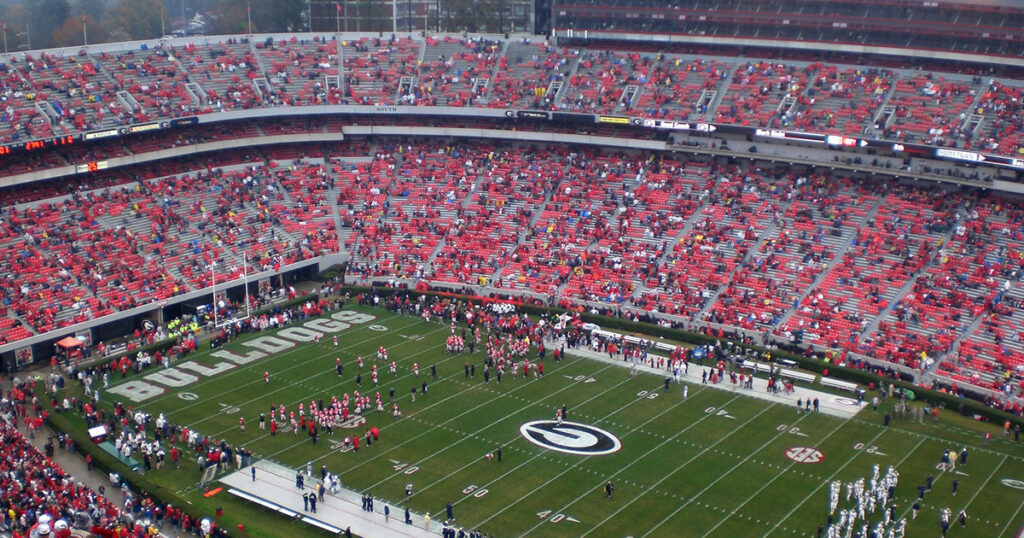
On Saturday, the University of Georgia Bulldogs football team will play Auburn University in Athens, Georgia. Home games seat 93,000 people in UGA’s Sanford Stadium in normal years and generate millions of dollars in revenue for the community through hotel fees and taxes, food and beverages, catering services, retail sales, tent rentals, and souvenir sales.
This season, because of Covid-19, only 23,000 people are allowed to attend inside the stadium, and tailgating isn’t permitted. But faithful Dawgs fans will not be deterred. One of those fans with tickets is Athens resident and UGA alumnus Carl Parks, who plans to attend all of UGA’s home games.
“I think everybody’s doing everything they can to minimize exposure,” he says. Inside Sanford Stadium, special seating will require no group of four people to be sitting closer than six feet in any direction from any other group of four people. Suites can be only 50 percent full. Everyone is required to stand six feet apart and wear masks as they come into the stadium and when they move around inside it—though not when they are seated and cheering. Hand sanitizer dispensers will be everywhere. The hospitality workers handling food and beverages will be wearing masks and gloves. Bathrooms will have individuals cleaning after every use.
“The way they’ve got the seating lined up, I feel pretty confident,” Parks says. “I was able to go to a scrimmage in the stadium and it’s sort of amazing, what they’ve done to keep people safe.”
Unfortunately, some UGA fans could take home more than memories. The chancellor of the University System of Georgia has ordered all 26 public universities and colleges, including UGA, to hold in-person as well as virtual classes for their 330,000 students for fall semester, which began in August. (Of the 14 schools that make up the Southeastern Conference, 13 are public institutions and are similarly open; only Vanderbilt, a private school, has opted for complete virtual instruction.)
UGA has reported having 3,739 confirmed cases of Covid-19 among its students and employees, one of the highest numbers of any public educational institution in the country. Seven football players were Covid positive when they returned to campus this summer for workouts, according to UGA officials.
The number of infected students is likely much higher—testing and reporting at UGA are both voluntary, and social media posts suggest students are loath to get tested or to report positive results. Faculty members have protested that the testing program is dangerously inadequate, and have criticized the university’s lack of transparency. Social media is filled with pictures and videos of downtown Athens at night, where crowds of unmasked young people line up to get into bars and unmasked students congregate on the lawns of fraternity houses.
Mark Ebell, a family physician and professor of epidemiology in the UGA College of Public Health, studies acute respiratory infections. He tracks the daily count of Covid-19 cases in the state and the county. Of the number of students who have tested positive, he estimates that 80 percent are asymptomatic, which puts at risk not only faculty members but also other students and UGA employees who work in residence halls, dining halls, and libraries on campus. Add to that the employees in Athens’s bars, groceries, restaurants, and retail outlets.
On Saturday, many of those students could be mingling with other football fans. Athens Mayor Kelly Girtz expects as many as 15,000 people without tickets to come to Athens to soak up the fall football atmosphere, heading to downtown bars and restaurants, to fraternity and sorority houses near campus, or to private parties. Just as they have in previous years.
“My concern is that you have this mass gathering, and then people go home and spread the virus to their friends and families,” the mayor says. “I don’t want Athens to be a giant petri dish.”
He has asked Georgia Governor Brian Kemp to amend an executive order reducing from 50 to 10 the number of people who can gather in a group. Though he wonders whether his request will be met, Girtz has also asked Governor Kemp to demand a “more structured” environment in bars, “with people seated and not standing around together,” the mayor says. “The SEC commissioner and member institutions like Georgia made the decision to have football games, but it’s up to the local communities to keep everyone safe.”
The number of Covid-19 infections in Georgia and Athens first jumped after Kemp allowed bars and restaurants to open in early July. Georgia now is approaching 316,000 cases, and Athens-Clarke County has 5,020, a number that doesn’t include the university’s totals.
To further reduce the likelihood of Covid-19 spread, Girtz wants to set up structured seating for bar patrons in downtown streets “to decompress the crowd. We could put some tables and chairs in a 40-foot-wide roadbed, along with messaging about masks.” Police officers, who wear N95 masks, will be handing out $25 tickets to those refusing to wear a mask. The second offense will cost $50, the third, $100.
The Athens-Clarke County Commission has struggled to maintain ordinances it has passed to protect residents. It was the first local government in Georgia to pass a shelter-in-place ordinance, in mid-March, but two weeks later, Governor Kemp allowed many businesses in the state to open. In early July, the commission made it mandatory to wear a mask. The commission rolled back “last call” from 2 a.m. to 10 p.m. in late July, before UGA students returned to town. After several bar owners sued, the government agreed to a cutoff time of 11:30 p.m.
“People who are going to the game are making the choice to put themselves at risk,” says Ebell, the public health doctor. “You couldn’t pay me enough to set foot in that stadium.”

